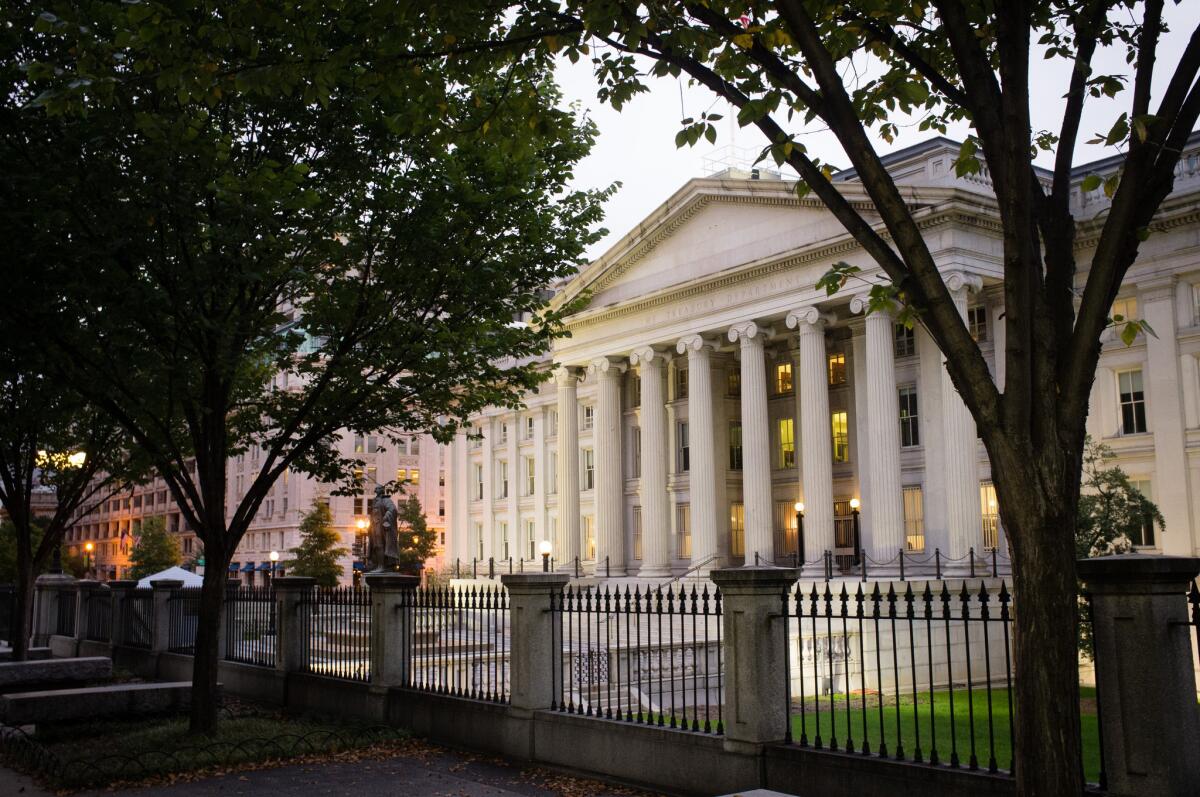Treasury postpones bond auction as debt limit deadline approaches

Contributions to the Treasury Department’s MyRA program can be made through direct deposit from a paycheck or a banking account. Treasury Secretary Jack Lew said the department is emphasizing the program in hopes that people will use some of their tax returns to begin saving for retirement.
- Share via
Reporting from Washington — The Treasury Department on Thursday postponed an auction of government bonds scheduled for next week because of concerns it would not be able to complete the sales because the nation is up against its debt limit.
The delay is the first related to a debt limit standoff since 2004 and a sign that the latest impasse is starting to affect government operations and financial markets.
The Treasury Department said Thursday that the standoff was “now adversely affecting the operation of government financing” and increasing its borrowing costs.
Treasury Secretary Jacob J. Lew has warned lawmakers that they need to raise the $18.1-trillion debt limit by Nov. 3 or the federal government risks a default. But congressional Republican leaders and the White House have been unable to agree on a debt limit increase.
Interest rates on U.S. government bonds that mature in November have increased compared with those maturing in October or December, the department said, indicating that investors are concerned that the debt limit fight could delay payments.
This week, Sen. Charles E. Schumer (D-N.Y.) cited those increases, which influence other interest rates, as a sign that “the consequences of brinkmanship and waiting until the 11th hour are already upon us.”
“People have to pay more for mortgages, people have to pay more for car loans, people have to pay more for student loans, small businesses have to pay more,” he said. “It’s gone up some, it’s going to keep going up more.”
An auction of two-year Treasury bonds was scheduled for Tuesday, with those sales becoming final on Nov. 2. But Treasury said there was a risk that it would not be able to complete the sales because of “debt limit constraints.”
Nov. 2 also is the day that sales would become final for upcoming auctions of five-year and seven-year bonds.
Treasury said it opted to postpone the two-year auction so that it would have enough money to complete other upcoming sales of longer-term bonds. Postponing those other auctions would have posed more risks for “market functioning,” it said.
“The Treasury [bond] market is critical to efficient funding of the federal government,” the department said. “Disruptions to this market can be costly to the U.S. government and ultimately the American taxpayers.”
The auction of two-year bonds would be rescheduled once the debt limit is raised, the department said.
The federal government technically hit the debt limit in March, but Treasury officials have been using accounting maneuvers to continue borrowing.
Those measures will run out on Nov. 3, putting the federal government at risk of default in the following days.
On Wednesday, the House passed legislation that would allow the Treasury to exceed the debt limit to pay principal and interest on government bonds as well as make payments to Social Security recipients.
But the bill has no Democratic support and President Obama has promised to veto it, arguing the debt limit should be raised so the federal government can pay all its bills.
Republicans want future spending cuts in exchange for agreeing to raise the debt limit. But Obama said he would not negotiate over the debt limit because the increase is needed to pay for spending that Congress already has authorized.
Follow @JimPuzzanghera on Twitter
More to Read
Inside the business of entertainment
The Wide Shot brings you news, analysis and insights on everything from streaming wars to production — and what it all means for the future.
You may occasionally receive promotional content from the Los Angeles Times.











